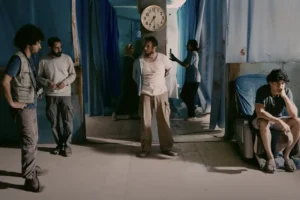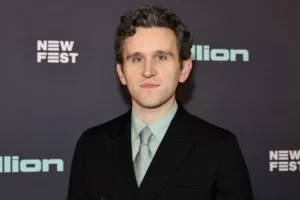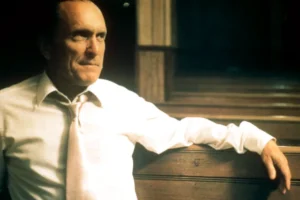by Saman Sadeghi Mehr
Reflection on the Activities of a Dynamic and Concerned Film Producer: Hamed Feizi
Eight years have passed since the production, screening, and public display of the controversial film “Yadom Toro Faramoosh” (Forget You, I Remember) by Ali Atshani, a cinematic producer. In recent years, Iranian cinema has witnessed the emergence of producers and new works that have examined social, historical, and cultural issues in Iran from different perspectives. Looking at the works produced in this decade, we intend to shed light on the artistic career of one of these creators. Although it may not have been imagined to span such a long period of time, it has appeared so brilliant and significant in these not-so-long years that we want to introduce it further.
Iranian cinema has experienced various ups and downs in recent years. From forced censorship to various international awards, the culmination of what has befallen Iranian cinema. During this period, young investors and producers such as Hamed Feizi emerged, who, with their concern for cinema and their belief in the value of content-oriented and author-driven cinema, were able to shine brightly.
In my opinion, Hamed Feizi can be considered a new phenomenon in Iranian cinema. His productions have always had a distinct character, and in addition to addressing social or real issues, they also follow very engaging stories, such as the film “Yadom Toro Faramoosh” by Ali Atshani. His films mainly draw from a good and often real story, capturing the attention of cinema critics. The performance and footprint of a capable and concerned producer can be felt and certainly admired in the films of this producer, as he consistently proves his abilities in various genres, even the challenging ones.
And now, Hamed Feizi and the thought-provoking film “Yadom Toro Faramoosh.”
The sensational story of the murder of Nasser Mohammadkhani’s first wife, a famous Iranian footballer, and its details dominated the headlines for years. The resulting trial led to a lengthy investigation of the case. After the conclusion of the mentioned case, Hamed Feizi, as the producer, and Ali Atshani in the director’s position, made a film called “Yadom Toro Faramoosh” about that judicial case and the family crime. It received significant feedback from audiences and critics following its public screening in the Perspective section of the Fajr Film Festival and its release in cinemas nationwide.
“Yadom Toro Faramoosh” is based on the life of a prominent and controversial football player and coach in Iran’s premier football league. It premiered at the 35th Fajr Film Festival and also participated in various international festivals, receiving multiple awards for Best Film and Directorial Achievement.
Damon Shams, a dismissed coach of one of the popular clubs, confronts a girl he had a relationship with years ago and unintentionally invades his privacy. This intrusion turns his married life into a series of bitter incidents, leading to the culmination of a crime that brings an end to this real story.
A film that was created with a single linear idea but transformed into a valuable work. It is worth mentioning that on the pretext of discussing the film “Yadom Toro Faramoosh,” we aim to explore the capacities and talents of the producer of this film. A producer who, in addition to this cinematic work, has also produced other influential films such as “Yek Qadam Ta Khoda” (One Step to God) and “Nate’ham” (Unfinished).
Without reflection, it must be said that the art of film production and the actions carried out within it can be an extraordinary experience for both the audience and critics and media professionals. Proper and relevant production, as exemplified by experienced producers like Hamed Feizy, is essentially the key to creating works such as the feature documentaries “Unfinished,” “One Step to God,” and “I Remember You Forgot.” These works are also very close to reality.
Creating films that, despite numerous limitations in traditional religious Iranian society on one hand and the complexity of the country’s governance structure on the other, undoubtedly requires remarkable audacity and courage. Feizy, as a producer, aims to convey in his cultural and cinematic productions that films made for political or social reasons, rather than focusing solely on their political aspects, hold a far greater significance in terms of their social and cultural aspects. In fact, family and social melodramas depict the cultural and economic situation of present-day Iran.
In essence, a producer with such a perspective becomes the main character of the story and the cinema itself. They are a concerned and thoughtful citizen who contemplates societal transformations and developments. Cinema as a tool essentially transforms producers like Hamed Feizy into social and political agents, with their concerns becoming the driving force behind the story of cinema, and subsequently, it is culture and society that advance the narrative.
It should be noted that in defining all the films that Hamed Feizy has invested his capital in as an investor and has also produced, it must be acknowledged that in terms of content, the audience of these works has essentially faced symbolic films. If we take a sociological perspective, we can say that Hamed Feizy’s films are the champions of societal awakening in the era of awareness dissemination.
Hamed Feizy, as someone who has always invested his capital in film production, faced dissatisfaction and anger from the dominant political forces. He must argue with determination that his works, from a cultural perspective, surpass the everyday cultural and historical purifications that form individual identities. For example, in films such as “One Step to God” and the controversial and sensational documentary “Unfinished,” he refers to the extensive purification of Iranian identity throughout contemporary history, rather than intending to make political criticisms of the government’s management.
Hamed Feizy is, in general, a producer who adheres to global cinema standards. These standards are derived from all aspects of his production. The selection of highly provocative topics and screenplays, which always work effectively in his films in terms of rhythm, is a testament to this.
He consistently chooses directors who are ideologically close to him and are generally accepted in the realm of Iranian cinema, like Atashani. The production teams are mostly commendable and, of course, alongside all of this, the production and management of works that are rich in creativity and innovation undoubtedly herald the presence of an intellectual and promising producer in Iranian cinema.
Producers like Hamed Feizy aim to use the tools of cinema, which are a manifestation of civilization, to say: every individual has a past, present, and future that constitute their identity. By ignoring and attempting to eliminate it, a part of their personal identity becomes completely distorted and destroyed. As a result, an identity-less individual becomes part of an identity-less society, which is unlike contemporary Iranian society. This crisis of identity and conflict must be addressed through the production of exceptional films.
















+ There are no comments
Add yours